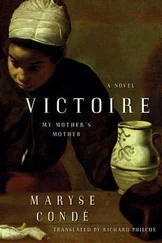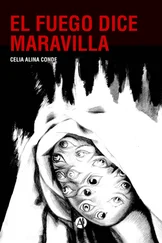“I did it for you as well,” Thomas kept repeating. “I did it for you.”
8
People in Bingerville still remember Celanire after so many years as a kaleidoscope of negative facets, whereas as a rule time tends to soften any bitterness. For them there was no doubt she was the “horse” of an evil spirit who had brought nothing but death, mourning, and desolation. Paradoxically, they also judge her as someone who should have been bound by the rules of society. Men think of her as a dangerous feminist. Yet what exactly do they mean by this word, which has so many significations? They cannot forgive her stand against excision. They swear she made the women rebellious, demanding, and disrespectful of the male species. They are particularly outspoken about the center she created for sheltering women who wanted nothing more to do with suitors or husbands. But despite its grand-sounding name, the Refuge of the Good Shepherd, a rickety wattle hut under a straw roof, the center never filled its function. One year it sheltered a group of wives arbitrarily repudiated by their husbands. Another year, a group of battered women. Around 1905 the mission turned it into a native dispensary. Some men go even further and claim that Celanire was a corrupting influence. They expatiate on what went on at the Home but have nothing to prove it. The African woman, they say, must be the eternal keeper of traditions. If she prostitutes herself, society is shaken to its foundations. But was it really a question of prostitution? It seems that the nurses received gifts in exchange for the favors they freely consented to their partners. Some of the French clients were extremely generous. Captain Emile Dubertin, for instance, left his entire estate to Akissi Eboni, who bore him a son. She made the journey to Nantes to receive her inheritance and was very well treated by the Dubertin family, who kept the child. Generally speaking, the generosity of the colonial civil servants allowed the ex-nurses to live the rest of their lives free from financial worries. Relatively well off, therefore, knowing how to read and write, they married into good families and helped form a genuine aristocracy in the country. As for the orphans, they made up the first contingent of teachers in the Ivory Coast. Some of them dabbled in politics and sat on the benches of the National Assembly in Paris.
Above all, nobody would admit that Celanire gave the town a certain character that it has lost only recently in the name of development. Besides the Home for Half-Castes, she transformed the sumptuous Governor’s Palace, which was a constant reminder of Charlotte’s death. A mournful and morose building, it had become a warehouse for storing pell-mell the packages of medicines, books for the mission school, and spare parts shipped from France for the factories. Thomas only occupied a small part of it: four rooms on the second floor — a study, a real shambles, a bedroom, unfurnished except for a deathly pale bed under its mosquito net, and a washroom where, among the pitchers and basins, all sorts of creepy-crawlies reveled in the humidity. The houseboys regularly killed snakes there of the most dangerous sort, those they called “masters of the bush.” The only attractive feature was a small living room, pleasantly furnished, where he would read at night.
With Celanire, all that changed.
Like Betti Bouah, she sent for Apollonians from the Gold Coast. Under her direction they worked for months, standing in the pale light of dawn and lying down in the black of midnight. She had no intention of imitating the style of the Home, and consequently, Bingerville could boast of two architectural treasures, each a source of pride in its own way. She had balconies suspended on the north facade of the palace, where the arabesques of their wrought-iron balustrades relieved the hardness of the stone. She also installed French windows to let in the light and the air, and extended the south facade with a terrace overlooking a garden that she stocked with monkeys and all types of birds — commonly found birds such as hyacinth macaws, brightly colored parakeets, large-billed toucans, budgerigars, and other chatter-boxes, as well as rarer species like those American yellow-tailed parrots called Amazonas. Clusters of kikiris hung on the branches of the azobé and ebony trees, while red ibis transplanted from the mudflats of the Aby lagoon waded through the grass on their long, melancholic legs. The roof of the palace was another open-air terrace where three hundred people could listen to music in the dry season. Once it had been restored, the palace was boldly painted ocher and pistachio green.
The interior was as sumptuous as the exterior. Two Fridays a month Celanire invited her husband’s compatriots to dinner and led her guests on a guided tour of the apartments. Even today, despite all the waste and excessive logging, the Ivory Coast is not lacking in wood. So with the help of the books of her “beloved little papa,” as she never failed to call him, Celanire initiated the Apollonians in the techniques of the furniture makers from Guadeloupe. They reproduced buffets à deux corps, arbalète commodes, spider consoles, recamier-style sofas, four-poster beds, and rocking chairs. Standing in front of the planter armchairs, she would explain that the arms pivoted into extensions so that the person seated could rest his legs in a horizontal position while sipping a rum punch, the traditional drink in Caribbean climes.
Finally Celanire turned Bingerville into an artistic capital. The highlight of the palace was its museum. It first took up a living room, then two, then the entire ground floor, and became the first “ethnographic museum” in Black Africa, far superior to the IFAN museum in Dakar. It is still a major attraction today. Its aim was to prove not only to the orphans at the Home but also to all those doubting Thomases that Africa has a culture of its own. The collection included Dan, Wobè, Gouro, Yaouré, and Baoulé masks, but especially masks from the Guéré people, masters of the art. The finest pieces in the museum were a series of nine Guéré masks: one singer’s mask, two warriors’ masks, two dancers’ masks, a mask for wisdom, a mask for running, a fool’s mask, and a griot’s mask. Celanire threw herself passionately into her treasure hunt. She had no qualms soliciting the chiefs and elders or mingling with secret societies and initiation ceremonies. This deeply shocked the Africans, who complained she was looting their sacred heritage. It would bring her misfortune. Women are not allowed to look at masks, let alone lay hands on them. Consequently, she would never give birth, neither to a son nor a daughter.
In actual fact the Africans could never forgive Celanire for marrying because she no longer had time to look after the Home and left Tanella in charge. For them, Tanella deserved to be stoned with a hail of rocks after murdering Mawourou and to rot without a grave on the land she had insulted. Her acquittal was scandalous. It was true Tanella did not have Celanire’s iron hand, capable of bringing to heel a troop of rebels. Under her management the Home foundered. Guinea grass overran the lawn. The papilios died in the aviaries. The nurses no longer wore white uniforms. The students’ success rate dropped to nil. Discipline became lax, as did hygiene. Epidemics returned at an alarming rate. One serious incident alerted the French authorities. An officer on leave from Upper Volta, Jean de Brezillac, stabbed a colleague, Melchior Marie-Marion. According to him, Melchior had stolen his “fiancée,” Akwasi, a nurse at the Home for Half-Castes, to whom he had given a gold ring. The latter denied everything. An inquiry was opened. But the inspector, housed at the Governor’s Palace, fell under the spell of Celanire. Consequently, his report boiled down to a panegyric of the “lovely Creole,” Madame de Brabant, and matters remained that way right up to Celanire and Thomas’s departure for Guadeloupe a few months later. This departure stunned blacks and whites alike. It was true Celanire never stopped talking about her childhood island to anyone she met. She liked to repeat that she kept the memory of it in her heart like a candle burning in front of the high altar, for a country, just like a mother, cannot be forgotten. She confided in close friends that she had a sacred duty to carry out: find her parents, especially her real mother. Yes, her birth had been darkened and marred by tragic events. That beloved little papa she spoke of so often was not her real father, even if their feelings for each other had been unparalleled. Despite all that, watching her bustling with activity in Bingerville, you wouldn’t be alone in thinking that Africa had replaced her island home in her heart and she would have trouble leaving. And yet she left.
Читать дальше












